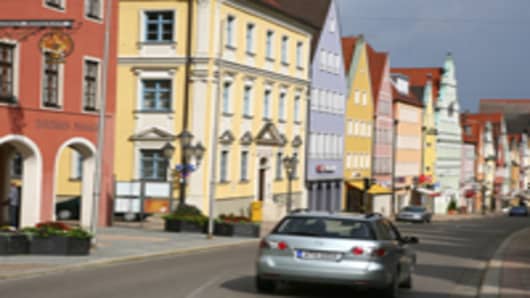Despite yielding extremely low or even negative returns, German Bunds have not lost their safe haven appeal, underscoring the huge appetite among investors for low risk assets as the euro zone debt crisis drags on. But a new asset class is on the rise – and many believe it has a lot more to offer.
Investors are flocking to the German real estate market, lured by steadily rising house prices, low mortgage rates and a stable macroeconomic outlook.
"'Safe haven' is on everyone’s lips. And if investors ask themselves in which regions and with which investment vehicles it is still possible to invest, they will not be able to avoid property,” Dr.Frank Pörschke, CEO of real estate services group Jones Lang LaSalle Germany said in the group’s latest German property market report.
Figures released on Tuesday showed the German economy grew modestlyin the second quarter, just beating forecasts and staying ahead of other euro zone countries facing stagnation or a contraction in growth.
Helge Scheunemann, head of research at Jones Lang LaSalle Germany told CNBC.com that insurance groups, pension funds and open-ended funds were the main buyers, and that investors were mainly German. They are interested primarily in existing properties, rather than new developments, in the western cities of Hamburg, Munich, Frankfurt and Duesseldorf.
“The rise in prices we currently see is mainly due to the stable economic situation we have in Germany and a decreasing unemployment rate, as well as a lack of supply of good property,” Scheunemann said. “The higher demand is related to the overall economic situation. We have low interest rates and fewer alternatives for institutional investors.”
Nominal house prices in Germany declined by around 10 percent between 2000 and 2005 and then stagnated until 2009, before rising at 2 to 3 percent per year in the last couple of years, according to Deutsche Bank research.
Prices are higher in the country’s biggest cities, but a discrepancy between the east and west of the country persists as people flee eastern Germany, including Berlin, in search of jobs in the more prosperous West.
Scheunemann added that unlike many Americans or Brits, most Germans are happy to rent for longer and don’t dream of home ownership (related: Americans Rewrite the Dream) .
In addition, 100 percent home purchasing loans are not available and buyers need a deposit of as much as 30 percent. These factors could help to explain why prices have remained relatively low.
“It is not a boom. You can’t compare it with the U.S. the U.K. or Spain,” Scheunemann said.
The gains witnessed in Germany are in line with economic growth in the country, analysts say, and differ significantly from the double digit increases seen in Ireland and Spain (related: Europe's Modern-Day Ghost Towns) before the credit crisis.
“Despite the deep global recession in 2008/9, Germany has experienced average annual real economic growth of 2 percent since 2005 compared to less than 1 percent between 2000 and 2005. The economy and residential property prices developed quite similarly,” Deutsche Bank said in a recent report. “The recent increase in residential prices went hand in hand with a rise in disposable income, so the price-to-income ratio remained flat.”
The bank believes the flight to safe havens is likely to continue to support German house prices in the near future with prices are likely to rise fastest in cities with more than 500,000 inhabitants.
Scheunemann agreed that prices were in line with the economic fundamentals, and largely dismissed talk of a brewing bubble in German property.
“There is good demand and incomes are stable,” he said. “There is a danger (of a bubble) maybe in a few years,” he said, with some signs in certain locations, but the gains seen so far in prices were not a cause for serious concern.



